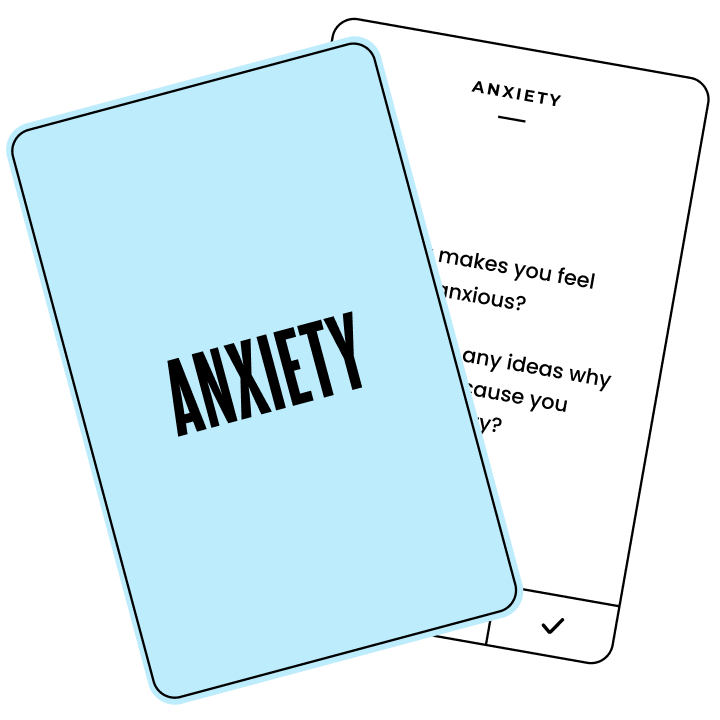

Start meaningful conversations about emotions
Take action to help your child move beyond “I’m fine.”
Look for a natural opening
Everyday moments with your child can easily turn into conversations about their emotional wellbeing. For example, if your child shares something that’s happening with a friend or classmate, you can ask them how that makes them feel or whether they’ve experienced something similar. Even watching a TV show or movie together can be a chance to talk about how they relate to characters' experiences or emotions.
If your child turns the question around and asks if you’ve ever felt that way, use the opportunity to be open and honest about your own experiences and emotions.


Ease into the conversation
Jumping into a conversation about emotions can be intimidating—especially for a child. Our Conversation Starter Pack is an interactive resource, available in English and Spanish, that empowers parents, caregivers, trusted adults, and young people to have thoughtful discussions. It includes reflection questions, dialogue prompts, and activities everyone can take part in.
Ask open-ended questions
Rather than making a statement like “Tell me about your day,” start by asking a question like "What was the most interesting thing that happened at school today?" or "What did you and your friends talk about?" Keep the conversation flowing with follow up questions like “How did that make you feel?”
If your child seems uncomfortable or intimidated when you ask direct questions, try asking more general questions that may help them open up.

Use the roses and thorns conversation model
If your child is hesitant to share, try starting with the roses and thorns conversation model. This is a great way to initiate a broader conversation about feelings. To start this, ask your child to identify:
- One part of their day that they thought was great (roses).
- One part they felt was difficult (thorns).
If your child hesitates, start with your own roses and thorns.
Stay calm
Be patient with your child during difficult conversations, even if they say something surprising, upsetting, or hurtful. Avoid taking the things your child says personally and reacting with frustration, judgment, or disapproval.
While you may have a strong reaction to what your child shares, remember this: the greatest gift you can offer an upset child is your steady presence. If needed, find someone to help you process your own emotions, or address them with your child at a later time when you are both in a calm place.
Sometimes anger, stress, and other complicated emotions can come out in unhealthy expressions like yelling and hitting. Make sure to validate the feelings they are experiencing while also communicating that how they are expressing them is not okay. Take breaks when needed. And if your child isn’t ready to talk about something, it’s okay to try again another time.
Create a safe space
Avoid blame or judgment. Establish a safe environment where kids know they won’t get in trouble for how they’re feeling. Let them know it’s okay to make mistakes and that we must learn from them.

Know when to comfort
It's never easy to watch your child go through hardships, especially if you don’t know the whole story. You might want more information about the situation, but trying to get reasonable responses out of a child while they're feeling overwhelmed is rarely productive. Offer comfort and support, and be patient.

Share your own experiences
When you share things you have gone through and how you navigate your emotions, you model to your child that it’s ok to express themselves while also helping them learn how to do so. Your vulnerability also helps them feel like they can be open with you too. However, be mindful that you are not unloading frustrations on your child or making them feel like they need to support you, which can harm their development and wellbeing.
Let them know you appreciate them opening up to you
After your conversations, always let your child know that you're glad they opened up to you. This can encourage them to open up to you again next time.
Talk with your child regularly
Make talking a habit. This will make it easier to help them when challenges arise.
Help your child feel safe about feeling and talking about different emotions. Whether they feel happy, sad, or angry—it’s okay to feel and talk about these emotions.
